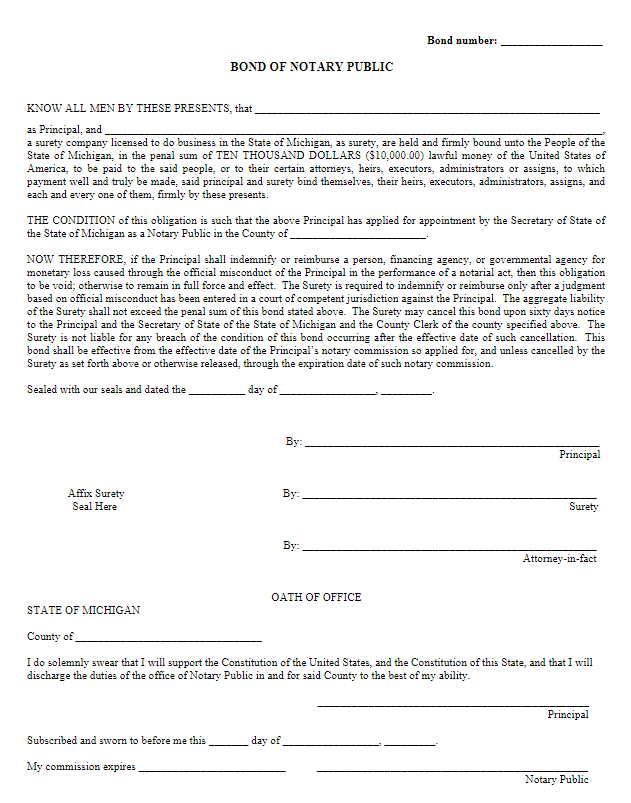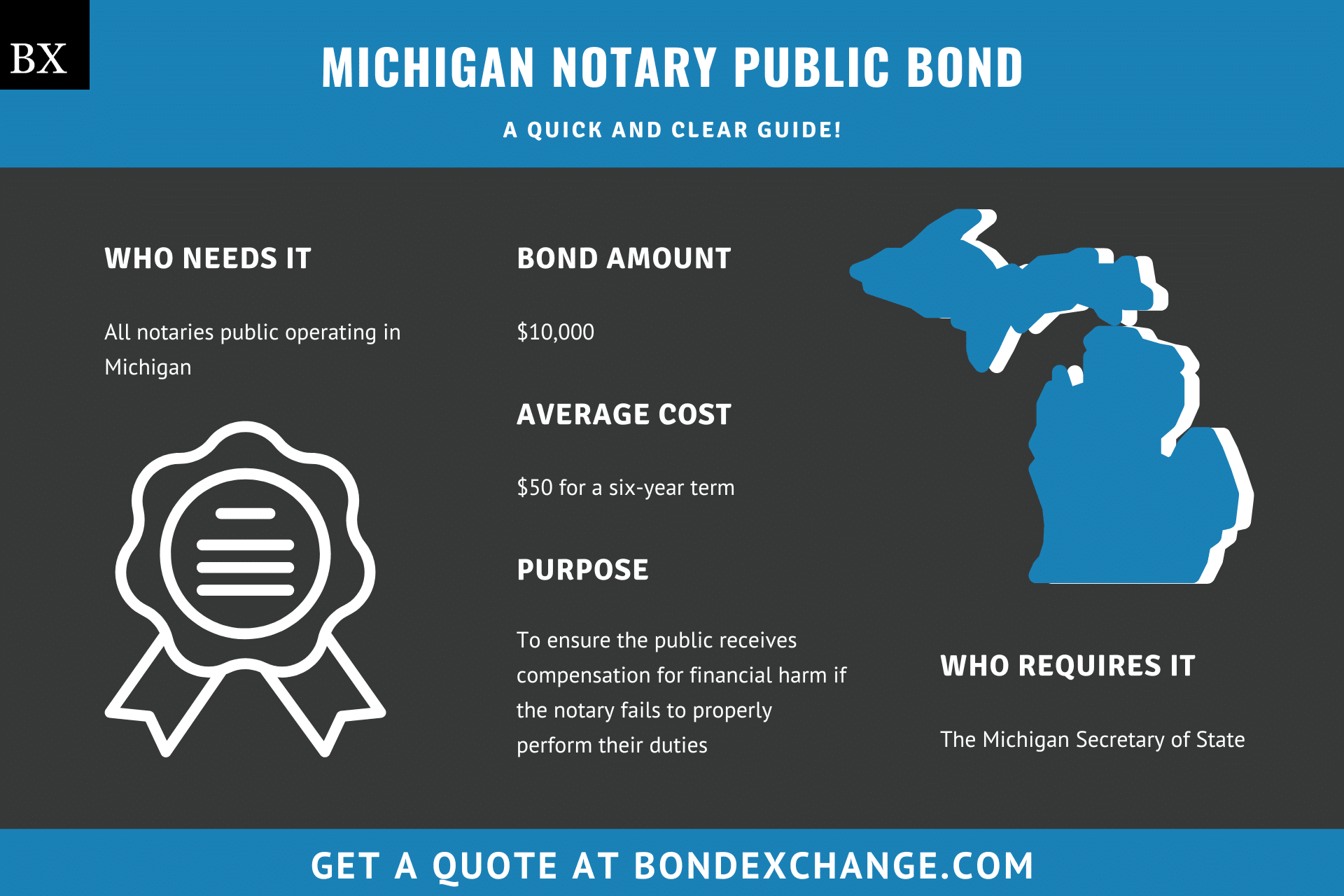Michigan Notary Public Bond: A Comprehensive Guide
This guide provides information for insurance agents to help their customers obtain a Michigan Notary Public bond.
At a Glance:
- Average Cost: $50 for a six-year term
- Bond Amount: $10,000
- Who Needs it: All notaries public operating in Michigan
- Purpose: To ensure the public receives compensation for financial harm if the notary fails to properly perform their duties
- Who Regulates Notaries Public in Michigan: The Michigan Secretary of State

Background
Michigan Compiled Law 55.271 requires all notaries operating in the state to obtain a commission from the Secretary of State before performing notarial acts. The Michigan legislature enacted this requirement to ensure that notaries engage in ethical business practices. To provide financial security for the enforcement of the commission requirement, notaries must purchase and maintain a $10,000 surety bond to be eligible for a commission.
What is the Purpose of the Michigan Notary Public Bond?
Michigan requires notaries to purchase a surety bond as part of the application process to obtain a notary commission. The bond protects the public from financial harm if the notary fails to comply with the regulations outlined in Michigan Compiled Law 55.273. Specifically, the bond protects the public if the notary signs any documents for persons committing fraud or does not actually witness the signatures on documents being notarized. In short, the bond is a type of insurance that protects the public if the notary violates the terms of their commission.
How Can an Insurance Agent Obtain a Michigan Notary Public Surety Bond?
BondExchange makes obtaining a Michigan Notary Public bond easy. Simply log in to your account and use our keyword search to find the “Notary” bond in our database. Don’t have a login? Gain access now and let us help you satisfy your customers’ needs. Our friendly underwriting staff is available by phone at (800) 438-1162, email, or chat from 7:30 AM to 7:00 PM EST to assist you.
At BondExchange, our 40 years of experience, leading technology, and access to markets ensures that we have the knowledge and resources to provide your clients with fast and friendly service whether obtaining quotes or issuing bonds.
Not an agent? Then let us pair you with one!
Click the above image to find a BX Agent near you
Is a Credit Check Required for the Michigan Notary Public Bond?
No, a credit check is not required for the Michigan Notary Public bond. Because the bond is considered relatively low risk, the same low rate is offered to all notaries in the state regardless of their credit history.
How Much Does the Michigan Notary Public Bond Cost?
The Michigan Notary Public bond costs just $50 for a six-year term.
Who is Required to Purchase the Michigan Notary Bond?
Michigan requires notaries public to purchase a surety bond as a prerequisite to obtaining a notary commission. To paraphrase the Michigan Secretary of State, a notary public is a public officer authorized to provide the services listed under Michigan Compiled Law 55.265, as outlined below:
- Take acknowledgments
- Administer oaths and affirmations
- Take verification upon oaths and affirmations
- Witness or attest to a signature
Notaries who wish to perform electronic or remote notarizations do not need to purchase an additional surety bond. In electronic notarizations, the notarization uses a digital signature but the notary is physically present. In remote notarizations, the notarization uses a digital signature and the notary is present through audio and visual equipment.

BondExchange now offers monthly pay-as-you-go subscriptions for surety bonds. Your customers are able to purchase their bonds on a monthly basis and cancel them anytime. Learn more here.
How Do Notaries Apply for a Commission in Michigan?
Notaries public in Michigan must navigate several steps to obtain a commission. Below are the general guidelines, but applicants should refer to the Secretary of State’s website for details on the process.
Commission Term: All Michigan Notary Public Commissions are valid for a 6 to 7-year period ending on the notary’s birthday (more on this later).
Notaries Public
Step 1 – Meet the Qualifications
To be eligible to apply for a notary public commission, applicants must meet all of the following criteria:
-
- Be at least 18 years old
- Be a citizen of the United States
- Live or work in Michigan
- Be able to read and write English
- Have not been convicted of a felony in the past 10 years
- Live or have a principal place of business in the county in which a commission is being applied for
Step 2 – Complete the Application
Applicants for a notary commission must complete an application either on paper or online. The application must be completed in its entirety, and notaries must disclose any criminal convictions and specify if they have previously held any notary commissions. Notaries will need to file this application with the Department of State and the clerk’s office of the county in which they live or work.
Step 3 – Purchase a Surety Bond
Notaries public are required to purchase and maintain a $10,000 surety bond.
Step 4 – File with the County Clerk
After purchasing a surety bond and completing the application, notaries must bring both to the clerk’s office of the county where they live or work. The clerk will review the notary’s application, return it to them if acceptable, and administer their oath of office. Notaries must pay a filing fee (typically $10) to the county clerk.
Step 5 – Submit the Application
Before receiving their commissions, notaries must submit their completed applications to the Department of State at the following address:
Michigan Department of State
Office of the Great Seal
7064 Crowner Drive
Lansing, MI 48918
Notaries that completed their application forms online have the option of submitting their completed applications online here. Notaries must include a $10 processing fee when submitting their applications. After their applications are processed, notaries will receive an email with their commission card and wall certificate. Once the notary is listed as “valid” in the Secretary of State’s online portal, they may begin performing in-person notarial services.
Electronic/Remote Notarizations
Step 6 – Select an Approved Technology Vendor
After receiving their notary commission, notaries public can become authorized to perform remote electronic notarizations by first selecting an electronic notarization platform to use. Notaries must choose from the approved vendor list provided by the state.
Step 7 – Complete the Form
Notaries must submit a request for change form to the Department of State prior to performing any remote or electronic notarizations. The form must include the platform being used, and notaries are required to include proof of purchase from the vendor. Once the Secretary of State approves of the change and adds the vendor to the notary’s profile, the notary may begin performing notarial services electronically or remotely.
How Do Michigan Notaries Public Renew Their Commissions?
Notaries must apply for a new commission before their existing one expires, as there is no specific renewal process. Notaries must renew their commissions within 60 days of their expiration date to avoid a lapse in commissions. All Michigan Notary Public Commissions are valid for a 6 to 7-year period, ending on the notary’s birthday. For example, if a notary’s birthday is in April 2022 and the notary applies for a commission in October 2021, the notary commission will expire on the notary’s birthday in 2028.
What are the Insurance Requirements for Notaries Public in Michigan?
Michigan does not require notaries to purchase any form of liability insurance as a prerequisite to obtaining a commission. Notaries public must purchase and maintain a $10,000 surety bond.
How Do Michigan Notaries File Their Bonds?
Notaries public should file their completed bond forms, including the power of attorney, with the clerk of the county where the notary resides. Notaries must file the bond with the county clerk when taking their oath of office.
The bond requires signatures from both the surety company that issues the bond and the notary. The surety company should include the following information on the bond form:
- Legal name and county of the individual buying the bond
- Surety company’s name
- Date the bond is signed
What Can Michigan Notaries Do to Avoid Claims Against Their Bonds?
To avoid claims on their bonds, notaries public in Michigan must adhere to all state regulations, including some of the most important issues below that tend to cause claims:
- Do not leave any notary supplies (seal and journal) in a place where they can be easily stolen
- Do not perform notary services for entities/individuals who are engaged in acts of fraud
- Ensure that the signers of documents are who they say they are and are not misrepresenting themselves
- Witness the signatures of all documents being notarized
- Record all transactions in a notary journal
What Other Insurance Products Can Agents Offer Notaries in Michigan?
BondExchange offers free notary E&O insurance with the surety bond purchase for notaries in Michigan. Unlike a surety bond, E&O insurance protects the notary rather than the public.
How Can Insurance Agents Prospect for Michigan Notary Customers?
Michigan conveniently provides a public database of commissioned notaries operating in the state. Contact BondExchange for additional marketing resources. Agents can also leverage our print-mail relationships for discounted mailing services.
What Other States Require Notary Bonds?
29 states and the District of Columbia require notaries to purchase a surety bond as a prerequisite to obtaining a commission. Insurance agents should utilize our Main Notary Bond Page for a detailed analysis of the Notary Bond requirements nationwide.

